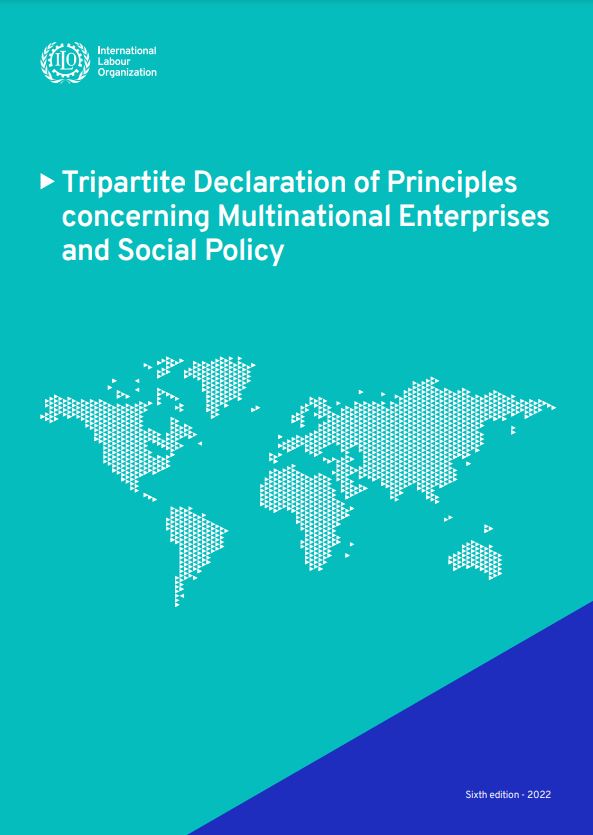Publications
2013
-
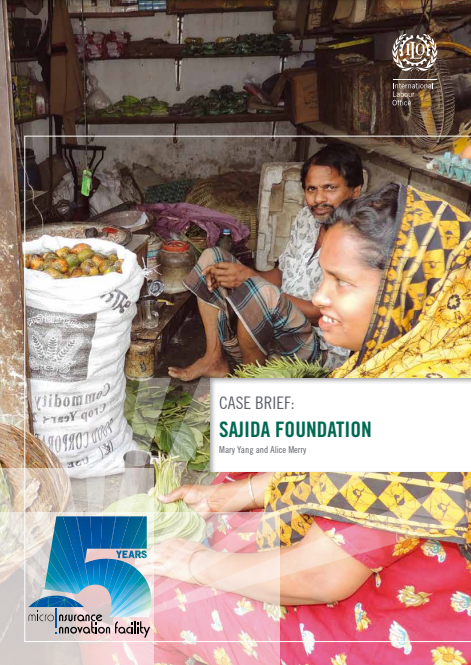
Case Brief #3: SAJIDA Foundation
01 June 2013
SAJIDA has consistently found ways to improve the value of its product for clients. From faster claims to community health workers, find out in Case Brief #3 how it uses the PACE tool to identify improvements.
-
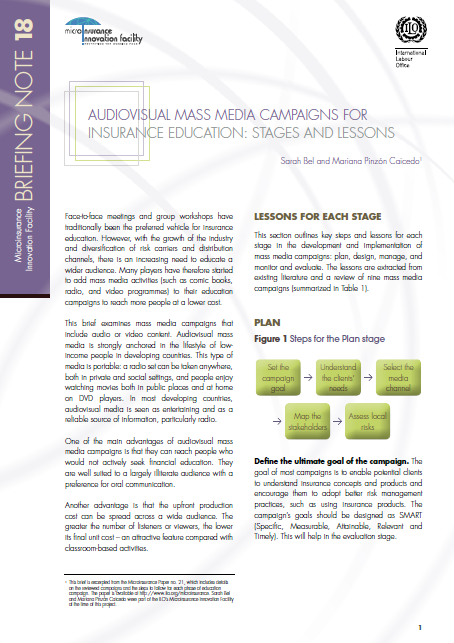
Briefing Note #18: Audiovisual mass media campaigns for insurance education: Stages and lessons
01 June 2013
As the microinsurance industry grows there is an increasing need to scale up insurance education efforts and educate a wider audience. Audiovisual media is an attractive dissemination channel to achieve this because it is strongly anchored in the lifestyle of low-income people in developing countries. Briefing Note #18 explores the stages of such campaigns and presents lessons learnt.
-
South Africa SME Observatory: The state of youth entrepreneurship in the Free State
21 May 2013
A baseline study of entrepreneurial intentions and activity amongst young men and women
-

Green jobs becoming a reality. Progress and outlook 2013
17 May 2013
By presenting a selected number of successful national experiences from 2012, the progress report illustrates the different levels at which the Green Jobs Programme operates. The report also provides an update on the activities which will unfold in 2013 with the continued support of the Programme’s networks and partners.
-
ILO and Cooperatives - ILO COOP NEWS No. 1, 2013
13 May 2013
This issue of the COOP News includes articles on: Post-2015 Development Agenda & COOP; Cooperatives celebrate International Women’s Day; Cooperative statistics to feature at ICLS Oct 13; Study tour from African coops to Japan; New study on financial cooperative resilience; ILO paper on Social Economy in Sudan; COOP and the European Task Force for Greece; COOP activities: Vietnam, Egypt & Sri Lanka; New feature: COOP Champions; Domestic workers cooperatives; Social and solidarity economy legislation; COOP exchange with the Social Finance Network; Start and Improve Your Cooperative Business; UNRISD conference.
-
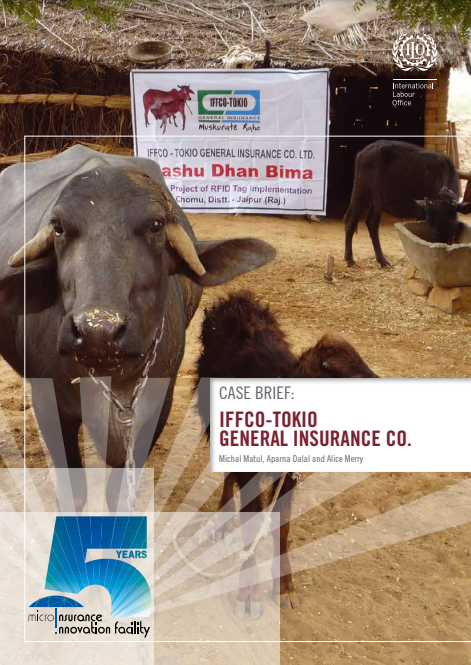
Case Brief #2: IFFCO-Tokio General Insurance Co.
01 May 2013
ITGI piloted radio frequency identification devices to address problems with claims. It used the introduction as an opportunity to change its processes. Find out how these changes allowed it to better serve its clients and improve the viability of the scheme in Case Brief #2.
-

Impact Insurance Research Paper #31: The impact of microinsurance on asset accumulation and human capital investments
01 May 2013
Can insurance transfer risk in a way that reduces the need for households to rely on costly coping strategies that undermine their future productivity? That is the central question that Research Paper #31 aims to answer based on evidence from an index-based drought insurance product available to pastoralists in northern Kenya. Results show that insured households are on average 22-36 percentage points less likely to anticipate drawing down assets and 27-36 percentage points less likely to anticipate reducing meals than their uninsured counterpart. Insurance not only smooths consumption but also improves the ability of recovering after a drought.
-

Impact Insurance Research Paper #32: Can microinsurance help prevent child labour?
01 May 2013
Child labour is a common consequence of economic shocks in developing countries. Research Paper #32 explores how reducing vulnerability through insurance impacts child labour and schooling. Using the case of a health and accident insurance scheme by a Pakistani microfinance institution, the study finds that increased insurance coverage results in lower incidence of child labour and reduced earnings from child labour. The effect is largely attributed to an ex-ante feeling of protection as opposed to a shock-mitigation effect.
-

Impact Insurance Research Paper #33: The impact of health insurance education on enrollment of microfinance institution clients in the Ghana National Health Insurance Scheme, northern region of Ghana
01 May 2013
Despite the fact that national health insurance has been available in Ghana since 2003, the coverage is far from universal. Research Paper #23 evaluates a consumer education intervention for microfinance clients by Freedom from Hunger and Sinapi Aba Trust designed to increase awareness, knowledge and eventually take-up rates of the National Health Insurance Scheme. Results suggest that the lack of knowledge may not the most important barrier to enrollment: while health insurance education appeared to increase knowledge of health insurance among those who received it, there were no significant differences in enrollment rates between the treatment groups and control group. Rather, it appears that convenience of registration and timing of premium payments were more common challenges faced by these individuals.
-
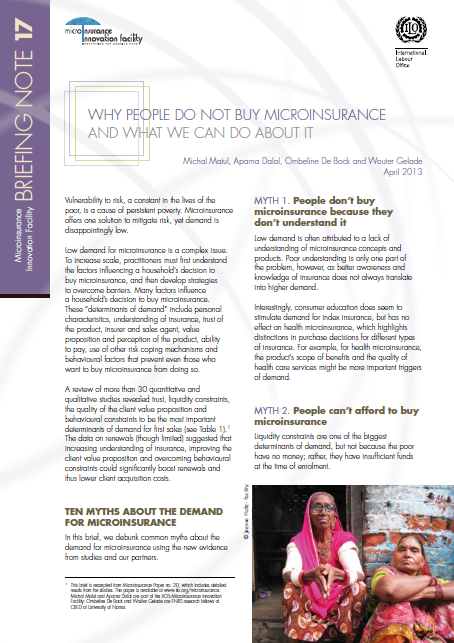
Briefing Note #17: Why people do not buy microinsurance and what can we do about it
01 May 2013
The findings of Briefing Note #17 debunk some of the most common myths about demand for microinsurance. The briefing note aims to help practitioners understand what factors determine demand for their microinsurance products. Based on a review of more than 30 studies, it blends academic findings with practical examples and presents solutions to improve demand.
-

Impact Insurance Working Paper #22: Beyond slogans: Good practices in promoting microinsurance products
01 May 2013
This paper provides examples of good practice for developing promotional campaigns. Based on dozen case studies, it provides microinsurance providers and their distribution partners with a ten-step promotional planning model that helps ensure that communication strategies attract low-income households by conveying appropriately the value of microinsurance products.
-
Professional microcredit in France: what effect on employment?
30 April 2013
-
"Is Small Still Beautiful?"
16 April 2013
Literature Review of Recent Empirical Evidence on the Contribution of SMEs to Employment Creation
-
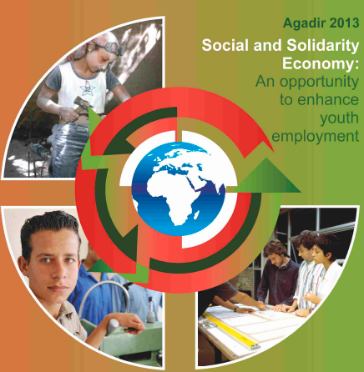
Social and Solidarity Economy: An opportunity to enhance youth employment
08 April 2013
Social and Solidarity Economy Academy, 8-12 April 2013, Agadir, Morocco
-
The Other-WISE
01 April 2013
Improving Productivity in Microenterprises by Reducing Occupational Safety and Health Risks
-
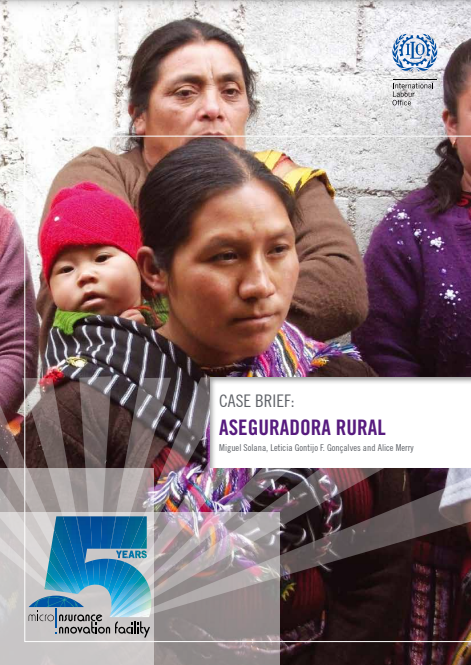
Case Brief #1: Aseguradora Rural
01 April 2013
In 2012, Aseguradora Rural registered the first approved health microinsurance product in Guatemala, sold through its partner, a large, trusted bank network. As highighted in Case Brief #1, it has been able to leverage clients´ trust in the bank to grow quickly. Now it is tackling the challenge of ensuring understanding and use of the product on an equally large scale.
-
The enabling environment for sustainable enterprises in Malawi
01 April 2013
Employment Sector - Employment Report No. 20
-

Resilience in a Downturn: The power of financial cooperatives
20 March 2013
This report reviews the performance of financial cooperatives, looking in particular at the aftermath of the 2007-2008 crisis and the continuing long austerity period. It explains why financial cooperatives have proven to be more resilient pointing to the specificities of the cooperative model of enterprise.
-

Green jobs in Mauritius. Experiences from a Small Island Developing State
11 March 2013
The Government of Mauritius has adopted a sustainable development framework called “Maurice, Ile Durable” and aims to be a model of sustainable development for Small Island Developing States. This synthesis report presents an overview of four studies carried out in Mauritius in 2011-2012 with support from the ILO Green Jobs Programme. Objetive of the studies was to explore the green jobs opportunities within the “Maurice Ile Durable” framework.
-

Methodologies for assessing green jobs
11 March 2013
This policy brief sets out the different methodologies available to assess the employment potential that green policies can offer and, in so doing, aims to help to focus policy decision-making in order to make it as efficient and productive as possible.
